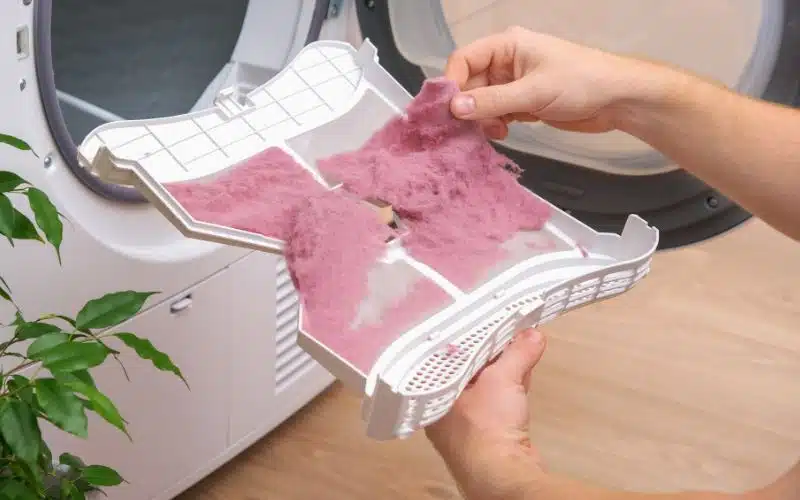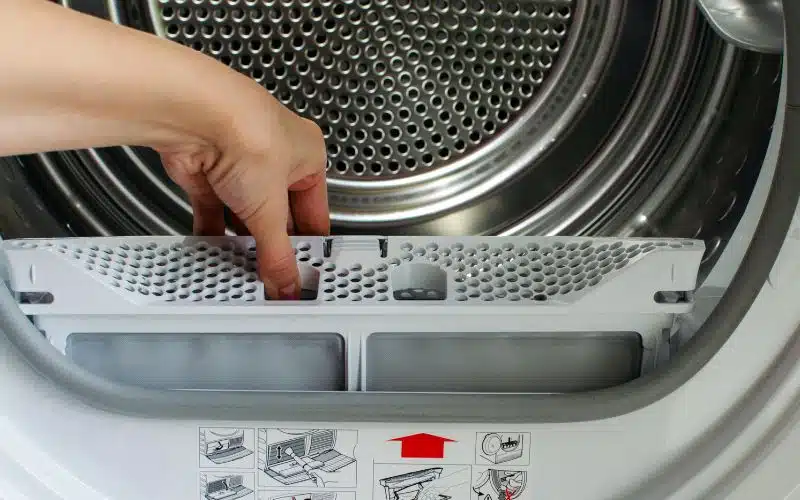Salt is an everyday staple and cheap ingredient found in every kitchen. However, it is also an excellent cleansing agent that takes care of stains and dirt, especially during laundry.
Using salts to do your laundry will mean using them in your washing machine. It can also serve as an alternative to fabric softeners.
Though salt is a cheaper cleanser, it can be challenging to determine if it hurts your washing machine.
Salt might leave stains in your washer, but it will not damage your washing machine. However, salt is good and cheap for laundry and can also serve as a fabric softener. It keeps colored clothes from bleeding and also helps remove armpit discoloration. However, ensure to use it in minimal quality to prevent rusting in your washing machine.
Is It Ok to Put Salt in the Washing Machine?

It is safe to put salt in your washing machine. Adding salt to your washing machine gives you a better washing experience.
With salt, you can get rid of stains like grease, wine, ink, rust, and blood from your clothes. You can also use it to remove mildew and discoloration in the armpits of your clothes.
To use the salt in your washing machine, locate the soap compartment in your load washer and pour the salt into the washing machine.
Though salt is a staple in most functional kitchens, you can also use it as a cleaning agent for your home and clothing.
For example, if you want your colored clothes to maintain their bright color after a wash, add some salts to the washing machine before you start the wash cycle.
The salt keeps the colored clothes from bleeding when washing. You can add the salt before you start washing and during the wash cycle to get the best out of the salt cleansing benefits.
It also gets rid of odors in your clothes and softens the fabric. Though salt will not damage your washer, it is advisable to avoid adverse salt effects in the future.
After using salt to wash your clothes, clean your washer thoroughly. Salt can leave nasty stains inside your washing machine if you do not clean the machine after each use.
Though you can remove the stains with vinegar or Epsom salts, it is not advisable to allow salt residues to stain the inner surface of the washer.
Though the salt might stain the machine, it will not damage the washer acutely. Salt is an efficient way to get rid of stubborn stains.
Though it is cheap and common, it can also become a valuable cleaning agent for your laundry.
Here are some easy steps to use salt in your washing machine.
#1. Automatic Washer
If you use an automatic washing machine, you will notice dedicated spaces for different detergents and cleaning agents.
Salt often serves as an alternative to cloth softeners, so locate the fabric softener compartment and pour in the salt.
Pour the ½ cup of salt into the detergent space and cover the compartment. Pour the salt according to the number of clothes you need to wash.
If the salt you added into the compartment is small, it will not have much effect.
Moreover, it would be best if you did not pour more than necessary, or you might need a lot of water to rinse your washer after doing your laundry.
#2. Manual Washer
If your washing machine is manual, it might not have a separate detergent compartment. As a result, you will have to add salt to your laundry manually.
To add the salt to the laundry, pour it into the washer tub after putting water and your laundry into the tub.
What Kind of Salt Do You Use for Laundry?
Common Salt, which is also known as Sodium Chloride (NaCl) or Table salt, is the best salt to use for your laundry.
Though you can use all types of salt for cooking, this does not work for washing. Salts like Epsom salts can harden your water.
Hard water limits the cleansing performance of the detergent on your laundry. The sulfate in the Epsom salts reacts with the calcium and hardens the water.
Though you can find some of these salts in your cleaning agents, it is often in refined and small quantities.
For instance, with ½ to 1 cup of table salt, you can keep the color of your clothes vibrant and remove odors and stains better from your clothes.
Where Do You Put the Salt in a Washing Machine?
If your washer has a detergent or cloth softener compartment, you can pour the necessary salt into the detergent space.
Generally, you can find this compartment at the top of your washing machine, where you pour your detergent.
However, if your washer does not have a detergent compartment, you can manually pour the salt into the machine.
First, pour the water and laundry into the washer drum. Then, pour the amount of salt you need for the laundry into the mix and start the wash cycle.
Salt has as many benefits in food as well as in your clothes. As ridiculous as that may sound, it is a fact.
Contrary to popular opinion, table salt does not stain or damage your clothes or cause your clothes to bleed during washing.
Here are some benefits of salts to your laundry:
#1. Restores the Yellowing Fabrics
Most fabric materials are prone to yellowing or fading when you expose them to harsh elements for a long time.
Stains from sweat and heat also give the same effect to your clothes, and the stains can be difficult to remove with only detergents. However, you can use salt to take care of these stubborn stains.
Mix ¼ of baking soda and a spoon of salt and pour the mixture into a bucket of water. Soak the clothes in the water for 30 minutes before washing.
Instead of using Epsom salts for delicate materials like nylon, you can soak the clothes in a salt and water mixture for an hour.
Then, rinse the clothes in warm water and toss the clothes into your washer.
#2. Brightens Faded Curtains and Rugs
If your curtains are losing their shine or your rugs are fading, you can brighten them by washing them with salt.
However, this remedy is only effective on washable curtains and rugs. Mix four tablespoons of salt in a liter of water and use the mixture to scrub the curtains and rug.
#3. Keeps Fabrics From Fading
Some new fabrics and colored cotton clothes are prone to fading due to constant bleeding during laundry.
It could also ruin the color of other clothes in the drum, rendering them unwearable due to the clothes dye stains from the bleeding fabrics.
However, you can put a stop to this with table salt. Before you wash the colored cotton fabrics, add ½ cup of salt to the machine.
You could also separate the colored clothes from other clothes before washing or washing the clothes together.
How many salts Do I Put In My Washing Machine?
For an average amount of clothing, pour half a cup of salt into your washing machine.
Adding salt to your laundry helps remove tough stains and makes the color dye in your clothes less soluble.
In addition, the salt will keep the clothes from bleeding and eventually fade and ruin the color of other clothes.
However, salt is more potent on natural clothes like cotton and wool. It has a lesser effect on synthetic fabrics like nylon and polyester.
While the machine is filling with water, you can add a spoonful of salt for each colored clothing in your laundry for more effect. You can double your salt input if the clothes are large.
Can You Wash Black Clothes With Salt?
You can wash black clothes with salt because it helps set and preserve the color of the cloth. In addition, it keeps the black dye on the clothes from fading and browning.
To wash your black clothes with salt:
- Separate the black clothes from the fabrics with bright colors. Turn the clothes inside out to prevent the effect of friction between the clothes in the washer drum.
- Put the black clothes in the washing machine and add half a cup of salt to the washer drum. Pouring it directly will help retain the clothes’ dark color and eliminate detergent residues in the clothes.
- For the wash cycle, avoid using a warm or hot water wash cycle to preserve the dark color of the clothes.
- Use a dryer to dry the clothes or spread the clothes in a cool shady place to avoid the fading effect of direct sunlight on the clothes.
Pros and Cons of Using Salt in Washing Machine
If the water you use for washing is hard, you will notice its negative effect on your washing machine.
Mineral buildup from the water will leave stains in your tub and pipes and might damage your clothes. However, you can reduce its effect by using salt in your washing water.
Below are the benefits and disadvantages of using salt in your washing machine:
#1. Benefits of Using Salt in Washing Machine
#1. Efficient Washing Machine
The salt you add to your washer reduces the mineral buildup and potential damage of hard water to your machine.
This way, the machine will function efficiently and last longer while consuming less energy.
#2. Cost-effective
Using salt water for your laundry also reduces the detergent you use in your washing. Salt can also serve as a fabric softener and reduce your detergent shopping expenses.
#2. Disadvantages of Using Salt in Washing Machine
#1. More Water Usage
Due to the amount of rinse and soak water you might consume while washing with salt, you may spend more money on water bills.
#2. Salt Pollution
Using salt constantly for your laundry can damage your environment. The saltwater can gradually discharge into your drinking water and the soil, damaging crops and causing health hazards over time.
| Pros | Cons |
|---|---|
| Increases efficiency of washing machine | Increase in water usage during washing |
| It makes clothes look brighter and cleaner | Pollutes the environment with salt |
| It helps save money on detergents |
Conclusion
Salt is a safe mineral for your washing machine and can be a suitable cleaning agent for your fabrics.
It retains, restores, and brightens your laundry, making it a cheap alternative to fabric softeners and most detergents.
However, use it only when necessary to avoid environmental pollution and to reduce water usage during laundry.





